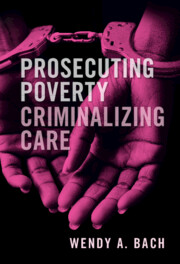Book contents
- Prosecuting Poverty, Criminalizing Care
- Prosecuting Poverty, Criminalizing Care
- Copyright page
- Contents
- Figures
- Acknowledgments
- Introduction
- Part I A Problem, a Solution, and a Quick Dive into History and Theory
- Part II Care As a Smokescreen
- Part III Criminalized Care
- Part IV Rejecting Criminalization and Reconceptualizing the Relationship between Punishment and Care
- Index
Introduction
Published online by Cambridge University Press: 25 August 2022
- Prosecuting Poverty, Criminalizing Care
- Prosecuting Poverty, Criminalizing Care
- Copyright page
- Contents
- Figures
- Acknowledgments
- Introduction
- Part I A Problem, a Solution, and a Quick Dive into History and Theory
- Part II Care As a Smokescreen
- Part III Criminalized Care
- Part IV Rejecting Criminalization and Reconceptualizing the Relationship between Punishment and Care
- Index
Summary
In the spring of 2013, in a hearing room in Tennessee, a group of legislators came together to create a new crime – the crime of fetal assault. A woman would be guilty of this crime if she took illegal narcotics while pregnant and her child was harmed as a result. The maximum punishment for this crime was eleven months and twenty-nine days in jail. Ultimately over the course of two years, about 120 mostly low-income women – rural, urban, Black, and white – would be prosecuted in Tennessee for fetal assault. The law was justified, in large part, by a very strange and deeply disturbing set of ideas: that the only way to help women who used illegal drugs while pregnant was to prosecute them, and that the prosecution itself was not only a road to treatment but was actually a form of treatment in and of itself. Despite these perhaps benevolent seeming ideas, the reality was quite different. Overwhelmingly, those women pled guilty and faced sentencing.
- Type
- Chapter
- Information
- Prosecuting Poverty, Criminalizing Care , pp. 1 - 10Publisher: Cambridge University PressPrint publication year: 2022

